
- Offer Profile
-
FRIMO. GLOBAL TECHNOLOGY SOLUTIONS.
Your full-service supplier for plastics processing solutions Whether local or global – we have systematically tailored our range of products and services to the needs of our customers, and offer assistance with our many years of experience in everything from planning to production. Our innovative solutions have received 26 SPE Awards. We have 900 employees throughout our locations in Europe, America, and Asia, as well as numerous international representatives.
PU PROCESSING TECHNOLOGY

-
Diverse material - diverse production solutions
An endless variety of parts can be made using soft, rigid, or integral foam. Our PU processing technology is used for a variety of applications in many industries, such as the sports and recreation and construction industries. We support you throughout the entire process so that even the smallest details meet your specific production requirements. Highly-specialized solutions are common in the transportation industry.
FRIMO PURe tooling and equipment is used in series production around the world in instrument panel, door panel, seat, and headrest production, as well as for insulation and structural components, cable over molding, and much more. In addition, polyurethane-based composite materials are steadily gaining importance in modern lightweight construction.

MODEL TECHNOLOGY & TOOLING
-
BRINGING YOUR DESIGN IDEAS TO LIFE
3D printing has revolutionized the production of leather models for instrument panels. Powdered plastics are used with the stereolithography process (SLA) and, for certain applications, the selective laser sintering process (SLS). This eliminates the need to produce a blank and the entire milling process.
A variety of models:- Cubing models
- Data control models
- Leather models
- Coating models
- Casting models
- Working and auxiliary models
- Coating models (Galvano)

PU TOOL CARRIERS
-
PLAYS THE SUPPORTING ROLE PERFECTLY
Our standard tool carriers meet all kinematic, clamping force, and clamping area requirements and can be used in stationary systems, turn tables, and overhead track systems. We've built well over 1,000 tool carriers, proving their reliability in production of both small and large parts.
FRIMO is your specialist for meeting customer requirements for optimal tool carrier concepts and specialty models. Our product portfolio includes a broad range of possible special designs, including for parts such as window frames, damping elements, cast skins, skis, acoustic parts, boilers, glass roofs, steering wheels, seat cushions, and headrests.

EQUIPMENT
-
UNIQUE DESIGN AND OPTIMAL FUNCTION
We use our years of process experience to give you machines that produce your PU parts cost-effectively and efficiently. We off a wide variety of solutions for combining tool carriers and metering machines, including everything you need for a complete production system. Our portfolio includes PU stationary machines and turn tables for continuous or cycled operation.
In addition to these well-known machines, systems with an overhead or floor track are also an interesting option, as they combine maximum flexibility with high productivity. The style and layout of all FRIMO PU equipment can be adjusted to suit the customer's wants and the space available.
FRIMO stationary machinesCustomer-specific machine layouts with
- Permanently installed mix heads
- Robot manipulators
- Manual mix head manipulators
- Suspended manipulators
THERMOFORMING TECHNOLOGY

-
Thermoforming and vacuum laminating – innovative solutions for low to medium volumes
Our thermoforming technologies offer a variety of options to help increase efficiency. Both rolled foils and sheet materials can be used to produce decorative trim parts.
During deep drawing, thermoplastic materials are warmed and contour formed. Vacuum laminating, on the other hand, involves heating a TPO or PVC foil and vacuuming it to the substrate, where it is then glued. IMG (in-mold graining) is possible with both processes, meaning the desired grain of the decor is incorporated into the tool shell and imprinted on the surface during the forming process. Most FRIMO machines are capable of having one or more of these processes integrated.
Starting in the development phase, we use 3D simulations and visualization technologies to optimize your series process parameters and shorten start-up times. A variety of patented FRIMO concepts help with energy and material savings. Our extensive standard thermoforming machines can also be equipped with many additional features.

Single-Station Machines
-
ECOFORM, ECOVARIOFORM & VARIOFORM
FRIMO EcoForm machines are designed as standardized single-station machines for deep drawing and vacuum laminating foils and sheet materials. FRIMO VarioForm thermoforming machines are primarily used in the automotive industry and are ideally suited for forming a wide range of films and sheet materials. Both thermoforming solutions can also be used in the IMG process (In-Mold Graining) to achieve surfaces with a perfect grain.








In-Line Machines
-
FRIMO VARIOFORM IN-LINE MACHINES
FRIMO VarioForm in-line machines are a perfect fit for economically deep drawing or vacuum laminating. A variety of concepts and models are available to fit every application. No matter which model you choose, cycle times for producing premium decorative trim parts for automotive interiors can be greatly reduced. Decorative surfaces for automotive interiors are a typical example. We have been continuously developing our machine concepts for decades at FRIMO.






IN-MOLD GRAINING
-
Efficient production of perfectly grained surfaces
A high-quality look and feel, along with innovative technology, play a big role in in today's automotive interior design. It can be challenging to use traditional thermoforming processes when trying to minimize grain stretch, maintain grain harmony between parts, and incorporate airbag logos, decorative stitching and different grain areas on a single part. During in-mold graining (IMG), the grain is first created on the foil during the deep drawing or vacuum laminating process.

3D Thermoforming Simulation
-
Perfect preparation and optimal production with FRIMO 3D thermoforming simulation
We offer support as early as the product development stage to help you achieve optimal thermoforming results in series production. With our 3D thermoforming simulation, you receive reliable predictions on feasibility, the optimal tool layout, foil usage, and attainable quality. Simulations are done primarily on thermoplastic compact or foam foils, mainly focusing on foil thickness, stretching, or wrinkling. Sheet materials up to 5 mm thick can also be simulated.
FRIMO 3D THERMOFORMING SIMULATION ADVANTAGES- Foundation for series part production
- Access to data bank of numerous foil parameters
- First results presented within 2 weeks
- Possible reduction of series start-up times by up to 50 %
- Prototype manufacturing possible in TechCenter

Time Shifted Heat Control
-
Efficient thermoforming with FRIMO Time Shifted Heat Control (TSHC)
The goal of the heating process during thermoforming is to heat the foils as quickly as possible, both in defined areas and across the entire surface. FRIMO has developed a new foil heating process specifically for this reason, called Time Shifted Heat Control (TSHC). The key is a specially-developed calculation algorithm, which switches the emitters on at the right time, taking overlap and peripherals into account.
A new heating concept for thermoforming- Foil temperature calculations take emitter layouts into account
- Automatic calculation of clamp frame geometry's influence
- Heating picture can be changed for each cycle
- Absolute temperature values entered in the display
- Automatic calibration cycle to identify foil's thermal properties
Flexible Trimming

-
Flexibly trimmed with the utmost precision
Precise cuts play an important role in the final quality of premium plastic components. Different geometries, materials, material combinations, and project requirements, such as volumes and the production environment, result in many unique project definitions. Our robot-assisted FlexTrim technologies guarantee the best solution to suit your needs.
Both simple and complex cuts can be precisely achieved, over and over again. We provide support right from the start, throughout engineering, prototyping, and the production of your tooling and equipment. In addition to our standard products, we offer custom and turnkey solutions that combine and automate various technologies and processes.



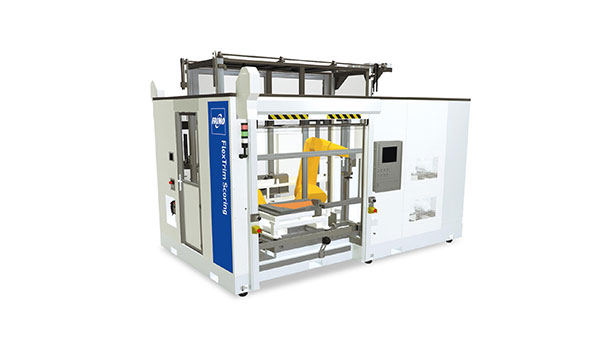
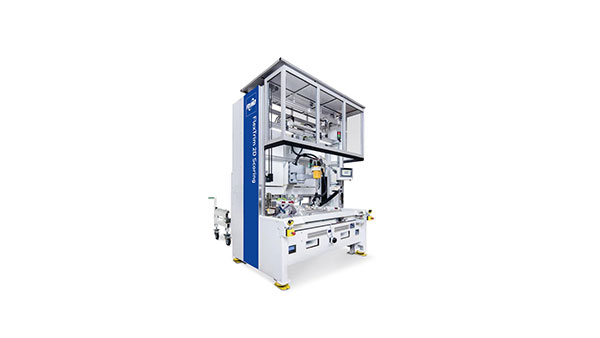





Scoring
- SCORING POINTS IN SAFETY WITH FRIMO SCORING
Scoring technology is used in the automotive industry for skin weakening in airbag areas on instrument panels and door panels. Highly-specialized blades and our online tracking are used to score targeted break-through areas that ensure controlled airbag deployment. Maximum precision and flawless quality are absolute musts. The material and application determine which of our variety of different blade systems to use.
Advantages:
- Highly-precise skin scoring invisible on the outside for all popular skin materials
- High degree of design freedom
- No thermal damage to skin
- Defined remaining wall thicknesses in areas with the tightest tolerances
- Maximum repeatability and process reliability
- Continuous process monitoring
- Quality guaranteed by integrated sensors and camera monitoring system

Ultrasonic Cutting
-
FLEXIBILITY WITH FRIMO ULTRASONIC CUTTING
During ultrasonic cutting, a frequency generator causes a very specialized blade to vibrate. The blade makes thousands of cutting strokes per second, controlled by the frequency set on the generator (usually 20-40 kHz). The blade and frequency are matched to your project requirements to help you achieve the best possible cuts.
This process is characterized by how clean, quick, and versatile it is. Maintenance is almost completely eliminated. Combining the advantages of ultrasonic technology with our robust, reliable machine technology is an interesting option for many applications. Interior and exterior automotive parts, packaging materials, and composite materials can all be processed efficiently.
ULTRASONIC CUTTING APPLICATIONS:
- Automotive interior and exterior components
- Substrates and foam (invisible airbag weakening)
- Composite materials
- Parts with coated/painted surfaces
- Packaging materials made of plastic, cardboard, etc.
- Sheets/films
- Mats and textiles
- And much more








Milling
-
FLEXIBLE ALL AROUND WITH FRIMO MILLING MACHINES
With FRIMO FlexTrim Milling Machines, we offer custom solutions for a variety of cutting applications. Our milling technology is especially well-suited for processing complex part geometries with defined cutting/milling depths. Many customers also use our machines to supplement the punching process or to produce low-volume part variations. We offer not only proven machine technology, but also sophisticated production concepts, even for high-volume projects.
Sophisticated fixture concepts are the heart of our machines. The better the fixture fits your project, the more efficient your serial production will be. Debris is a process-related issue for which we offer solutions unique to the market. We even have flexible solutions for waste removal and transport.




Surface Treatment
- Perfectly prepared with FRIMO surface treatment
Robot-assisted systems are our specialty. Surfaces are, too. That's why we offer robot-based solutions not only for flexible trimming, but also for surface treatment. FRIMO flame and plasma treatment machines specifically prepare plastic substrates for the subsequent process. The robot-assisted surface treatment occurs through either flaming or plasma technology.
The treatments increase the surface tension of the parts to ensure optimal adhesion of foams, coatings, or lamination applied afterwards, resulting in impeccable quality and permanent bonds. Areas of the substrate that should not bond can be shielded from the gas flame treatment.

Deburring
-
MAXIMUM FLEXIBILITY.
ONE STANDARD - MANY OPTIONS.In the plastics sector, there are a number of diverse components that have to be deburred in certain areas. In close cooperation with Schunk, FRIMO has developed a standardized, flexible deburring cell. Here, the protrusion is milled off with a special deburring spindle or precisely deburred by an ultrasonic blade. The cell is equipped with a T-slot table on which the component to be processed or further processing stations can be fixed.
In the example application, the robot guides an air-driven deburring spindle, which is mounted in such a way that the transverse force on the milling tool can also be adjusted via compressed air. This ensures a certain tolerance compensation during deburring. The work tasks for the cobot (collaborative robot), which is also mounted on the slot table, can be programmed by simple manual guiding.
Press Laminating

- Unique design details make surfaces stand out. The designs of our press lamination solutions are just as unique as the materials and requirements in your project, and they provide maximum material savings and efficiency. This is achieved through the FRIMO Accurate Blank Laminating (FABL®) process, by processing optimized contour-cut blanks, including the edge fold, within one machine.

Leather Lamination
-
Leather laminating is found mainly in the automotive industry. High quality vehicle interiors are characterized by a sophisticated design made of perfectly processed and adapted materials. Leather surfaces are no longer exclusively reserved for premium vehicles; they are also becoming increasingly used in high volume and mid-priced vehicle interiors.
As a natural material, leather presents tough processing challenges. Processing delicate materials, like leather, efficiently and with repeatable quality requires special know-how. The individual processes – surface treatment, adhesive application, and the actual leather lamination – must be precisely coordinated.

Robot Cells
-
The success of our robot cells stems from creating clever combinations for fast production. These combinations are a more efficient alternative to having multiple machines for medium to high volume armrest, door upper, bolster insert, and instrument panel production. "All in One" means combining pre-fixing, hotmelt adhesive application, and the subsequent press laminating/edge folding process in a single production unit.
By combining these individual steps, and handling parts for adhesive application with robotic support, resources are reduced in multiple areas. Less space and fewer operators are required. The result: attractive soft-touch surfaces made of leather, artificial leather, textiles, or films with polyurethane foam or spacer materials. Plus, all production parameters are permanently recorded, making the process incredibly reliable.

FRIMO Accurate Blank Laminating/FABL®
-
Processing exact contour-cut blanks with FABL® It is simply not possible to save more material during press laminating than with FABL®. This advanced press laminating technology can process exact contour-cut blanks made of TPO/PVC sheets, textiles, or artificial leather.
These are then positioned, laminated to the substrate, and edge folded all in one step. FABL® reduces material waste and increases production efficiency for premium surfaces in a flexible, sustainable process.

Groove Laminating
- GIVE LIGHTWEIGHT COMPONENTS A PREMIUM LOOK
FRIMO Groove laminating allows you to use different decor variations on a single substrate. It is most commonly utilized on
doors in automotive interiors.There is only one condition: the substrate must have a groove to tuck the edges of the decor into. During the process, a blade tucks the edges of the decor into the substrate's groove, where it is secured with adhesive.
FRIMO GROOVE LAMINATING ADVANTAGES
- Cost-effective product enhancement
- Fast, material-saving, combined process
- Joining processes not required
- High structural stability, yet lightweight
- Excellent crash behavior

Product Based Solutions
- PRODUCT-BASED PRESS LAMINATING SOLUTIONS
Press lamination solutions are quickly gaining importance in the automotive industry compared to classic vacuum lamination. With autonomous vehicles, interiors in particular will undergo a complete redesign. New materials and functions also bring new challenges for volumes and technical requirements. Customization will become even more popular.
Our customers need tooling, equipment, and processes that can variably and cost-effectively process as many different surfaces as possible. The need for product-specific solutions is growing to make part production optimal for functionality, quality, reliability, and efficiency.
Punching

-
When it comes to high volumes, you can trust our efficient punching equipment to get the job done. We are experts in all punching processes, even for highly-complex and large parts. We also offer automated and linked systems.
Extremely efficient and reliable - perfectly tailored to your needs
At FRIMO, you get comprehensive and optimally-customized punching solutions for a wide variety of applications. We are the leading specialist in high-volume, complex punching projects. Our systems are used across the globe in the automotive industry for punching instrument panels, center consoles, door and column panels, and bumpers. The punching methods we use encompass all principles of die cutting and kiss cutting.
Additional special types of punching can be combined with each other or with other processes, such as edge folding. For these special situations, we have automated and connected systems. Your advantage? 100% reproducible, highly-precise punch results with short cycle times, an efficient process, and minimal floor space requirements.






Punching Equipment
- Perfect for your project - EcoCut S, EcoCut C, EcoCut TC or EcoCut U
FRIMO provides you with comprehensive, perfectly customized punching solutions for multiple applications. We are a leading specialist when it comes to complex punching tasks for high-volume production. Our systems are used worldwide in the automotive industry for punching instrument panels, center consoles, door panels and pillar trims. The punching processes we use cover all the principles of die cutting and kiss cutting.
Further special forms are also used in combination or with other processes, such as edge folding. We offer automated, interlinked systems for this. The advantages for you? You have 100 % reproducible, high-precision cutting results in short cycles with high profitability and low space requirements.
- FRIMO ECOCUT C
- FRIMO ECOCUT TC
- FRIMO ECOCUT U
- FRIMO ECOCUT S

COMBINED PUNCHING SOLUTIONS
-
Punching, embossing, and welding exterior parts in one machine
The FRIMO CombiCut machine is specially developed for punching, embossing and joining bumpers and other grained, painted or unpainted exterior plastic components. The CombiCut is great for high-volume production, especially with many variations.
Optional punching and mounting elements such as parking assistants, headlight wipers, fog lamps, side-markers and trailer hitches can be added just prior to final assembly, reducing inventories and simplifying storage.

COMBINATION/SPECIALTY TOOLS
- Custom technology combinations and specialty tools
Combination tools allow different technologies to be combined for more efficient production. Typical technologies combined (depending on the requirements) are foaming, forming, laminating, edge folding, punching and joining. These processes allow different materials and material combinations to be used. Combination tools enable a very fast and cost-effective production process with minimized floor space requirements.
With extensive expertise and numerous serial projects in the books, we are able to supply optimized tooling solutions for parts of all sizes that perfectly meet your requirements. Our tools are available in steel, cast steel, aluminum, cast aluminum, or nickel shells. We also offer tools with interchangeable inserts, allowing efficient production of multiple parts in a single unit.

PRODUCT-BASED SOLUTIONS
- Custom punching equipment for every application
We are experts in unique punching solutions, combinations with other technologies, and automating punching processes. We offer support early in the development stage of your production process to achieve the most efficient part production.
We determine the best possible process together with you based on your project's parameters and validate it through trials in our TechCenter. Our early involvement in product and process development lowers your overall investment and production costs, and gives you the reliability and operational availability you need in series production.
Edge Folding

-
We think ahead of the curve to finish your products using a reliable process without rework, and with perfect edges. We don't have a one-size-fits-all solution; instead, we have a variety of unique solutions, which can be seamlessly combined with other technologies. This helps us efficiently achieve your highly-complex tasks.


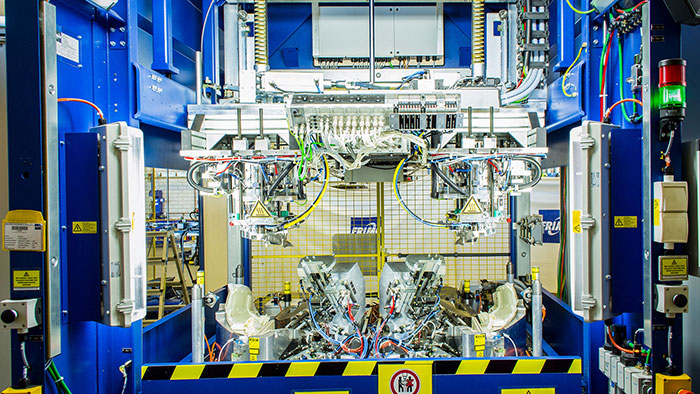



EDGE FOLDING EQUIPMENT
-
The most advanced edge folding technology with a variety of design configurations
We offer machine and tooling technology optimally matched to your project and material requirements. Volumes and cycle times determine whether single-station or in-line solutions will be the best fit. Our machines' high standards can be expanded with a variety of options.
Parts with intricate geometries often contain complicated edge fold areas. Our edge fold slider designs, which we have perfected over the years, play a key role under these circumstances. FRIMO edge fold sliders close seamlessly and move independently, both vertically and horizontally.
- FRIMO SINGLE-STATION EDGE FOLDING MACHINES
- FRIMO MULTI-STATION EDGE FOLDING MACHINES
- FRIMO COMBINATION EDGE FOLDING MACHINES

EDGE FOLDING SYSTEMS
-
THE MOST ADVANCED EDGE FOLDING TECHNOLOGY
We offer machine and tooling technology optimally matched to your project and material requirements. Volumes and cycle times determine whether single-station or in-line solutions will be the best fit. Our machines' high standards can be expanded with a variety of options. The process for edge folding with adhesives depends on the type of adhesive.
The processes differ depending on whether the adhesive needs to be activated or not. Parts with intricate geometries often contain complicated edge fold areas. Our edge fold slider designs, which we have perfected over the years, play a key role under these circumstances. FRIMO edge fold sliders close seamlessly and move independently, both vertically and horizontally.
PRESSING/FORMING LIGHTWEIGHT SOLUTIONS

-
Fiber composites are essential to modern lightweight construction because they can be customized in many ways. Using our extensive experience in composites, we are able to offer the best possible thermoplastic and duroplastic process tooling and equipment technology for lightweight and structural parts.
Developing innovative tooling and equipment for lightweight construction is one of our distinctive capabilities. We offer support from the very beginning for development of new, cost-effective processes, alternatives for established processes, and substitution of steel and aluminum parts. As a global partner for simple to complex tasks in fiber-reinforced materials, composites, and lightweight construction, we take all the details of your lightweight construction requirements into account during the design development phase.






NFPP TECHNOLOGY
- Natural fiber (NF) and polypropylene (PP) composites
Natural fibers are so attractive for industrial use because of their good mechanical properties, such as rigidity and stability, and combine good insulation properties with lower densities. If there were a formula for success for sustainable lightweight construction, it would be based on combining natural fibers with polypropylene. The composite material NFPP is popular in the automotive industry, particularly for the production of interior paneling, not only because it is lightweight, but also because it is well-suited for many process combinations.
Through our NFPP Hybrid technology, we combine forming, trimming, and back injection, which allows functional elements to be integrated. With our NFPP OneShot technology, we combine multiple processes, such as forming, laminating, and trimming.
- NFPP
- NFPP ONESHOT
- NFPP HYBRID
- NFPP TOOLING

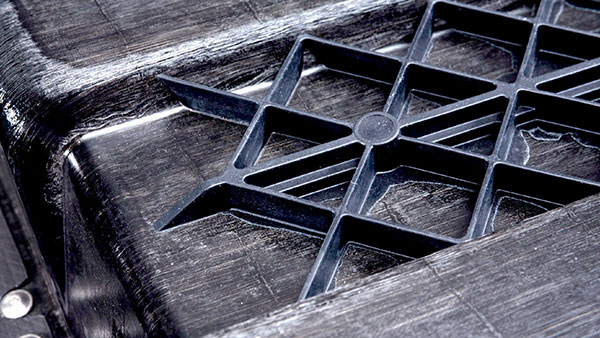
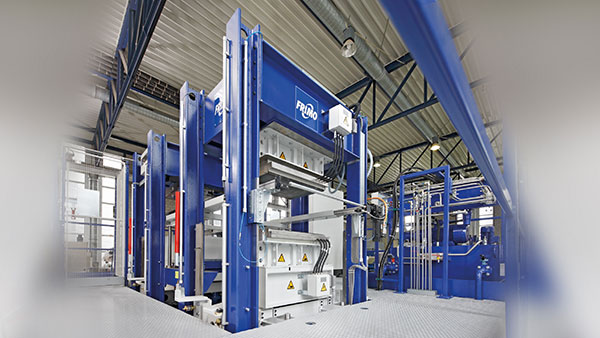



ORGANO SHEET INJECTION
-
Strength in every fiber
Organo sheets are high-performance, semi-finished materials with carbon, glass, or aramid fiber fabrics embedded in a thermoplastic matrix. Our fully-developed Organo Sheet Injection process (OSI) features short cycle times for thermoplastic structural components that are not only considerably lighter, but that can also include many functions.
Additional functional elements can be integrated with back injection, including mounting eyes, weld domes/ribs, or targeted reinforcements, and the edges of the part can be perfected. The costs of handling and storage are significantly reduced through combining the processes in one step.
- FRIMO OSI PRODUCTS
- ORGANO SHEET INJECTION PROCESS
- MULTIFUNCTIONAL TOOLING AND EQUIPMENT
- BACK PRESSING FOR D-LFT HYBRID STRUCTURES


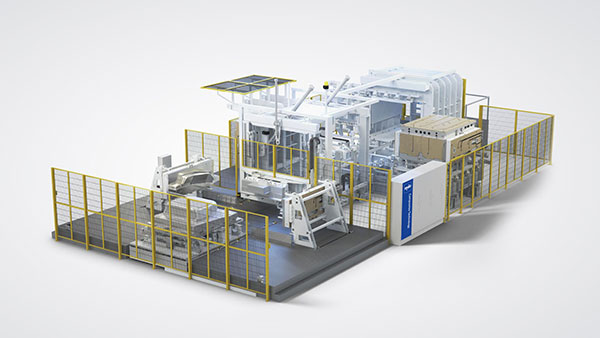



PREFORMING & RTM
-
A STRUCTURE THAT IS BOTH LIGHTWEIGHT AND STABLE
RTM (Resin Transfer Molding) processes offer the best conditions for producing extremely efficient and resilient structural components with maximum potential for weight savings. Fiber fabric preforms are placed in the tool and the closed tool is injected with a reactive resin system under high pressure. The various matrix materials, such as epoxy or polyurethane-based materials, each create specific process requirements.
We provide feedback to help to optimize production of your part and supply not only tailor-made tooling and equipment, but also complete production solutions. Our focus is on continuing to develop the RTM process and the production process for fiber composites in high volumes. The fastest injection process possible and short amount of time the part spends in the tool contribute to shorter cycle times. The composition of the preform also has a significant influence on the mechanical properties of the part.

WET COMPRESSION MOLDING
- Minimized cycle times, maximum performance
FRIMO Wet Compression Molding (WCM) machines are fully automated and capable of producing both monolithic or sandwich-style fiber-reinforced structural automotive components. The WCM process allows the use of fast cure resin systems and therefore offers significant cost and cycle time advantages over RTM processes.
Compared to RTM, the pressures used for forming are much lower, allowing for integration of lightweight sandwich cores (e.g. pre-milled paper honeycomb), complex 3D PU foam cores, or pre-assembled PET foam pieces. FRIMO offers not only tailored tool and pressing technology, but also custom solutions for automated manufacturing of sandwich cores.
- WET COMPRESSION MOLDING PROCESS

RESEARCH & DEVELOPMENT
-
Innovative materials and trendsetting, efficient processes
Because we want to be able to continue offering competitive solutions for lightweight construction requirements, we are strongly involved in both private and cooperative research projects. Along with our own internal research and development efforts, we also look for opportunities to collaborate with universities and institutes in relevant research projects. Through these strategic partnerships, we can apply for funding to initiate new developments. The contributors and framework are defined in advance. The success of the project, in terms of the intended technical innovation, can be measured by the resulting sample parts.
- SMiLE RESEARCH PROJECT
- iCOMPOSITE 4.0

COMPOSITES ALLIANCE
- Complete solutions with the Composites Alliance
The Composites Alliance between FRIMO and SCHULER is truly notable in the lightweight construction industry. Within the partnership, both companies use their core capabilities to create custom, complete solutions for lightweight construction projects. SCHULER's established compression technology is complemented by innovative tooling and customized automation solutions from FRIMO.
You profit from additional possibilities, fewer interfaces, and continuous, complete processes, including peripheral equipment. The leading know-how of the Composites Alliance comes from an extensive range of references in the automotive and aerospace industries, as well as other applications. We don't just offer technology, but rather true added value, helping your production reach peak performance.
JOINING/GLUING A PERMANENT BOND

-
Our customers associate us with high quality, making us a strong partner when it comes to perfect material bonds. We will help you find the right welding or riveting method or combination of methods for your material combinations, part geometries, and volume requirements.
Joining applications are becoming more complex and diverse, and quality requirements are increasing. Different processes are used depending on the application area and the material combination, part geometry, and volume requirements.
Considering weldability during the design stage creates advantages later on. This is because the only way to compensate for tolerances and guarantee reliable welds is with perfectly designed weld-seam geometries. Our special FRIMO controls technology also plays a considerable role in the efficiency of the processes.




INFRARED WELDING
-
The strongest bonds for large plastic parts with 3D weld contours
Thermoplastics can be welded together using INFRARED radiation. Some of the radiation in infrared welding is absorbed by the material and transformed into heat. As a result, the surface layer is melted and the plastic components can be joined by being pressed together. Infrared heat is transferred without contact. The heat input is fast, specific and energy-efficient.
Power-controlled and time-controlled INFRARED emitters allow for precise and controlled welding processes. Typical applications are instrument panels, door trims and center consoles with complex, 2D or 3D welding contours. Particle-free welding is particularly used for joining air-duct pipes, fluid containers, tank systems and filters or filter housings.




HOT PLATE WELDING
- FRIMO JoinLine Tooling & Equipment
The FRIMO machine portfolio for hot plate welding is comprised of various sized standard machines for welding parts of different sizes. Common applications in the automotive industry include glove boxes and center consoles. During hot plate welding, the plastic parts are welded using radiant heat and contact with an electric hot plate. Despite involving contact, this is a particle-free process that allows very strong and completely tight welds to be created for a number of different plastics.
Even thin-walled parts with complex 3D contours can be processed reliably with this well-established, robust process. Modern tool change systems, sophisticated drive technology, and the appropriate degree of automation increase productivity and make this fully developed process attractive for a number of industries and applications.


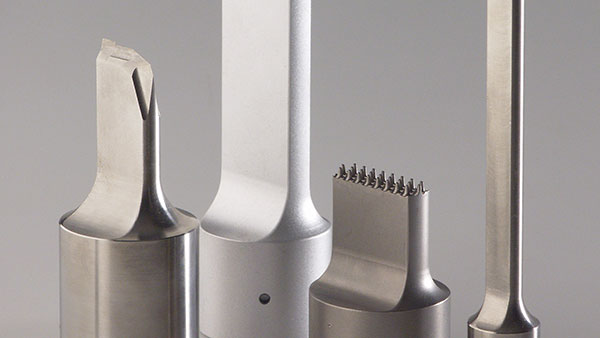



ULTRASONIC WELDING
- High-quality and technologically perfected plastic joining process
During ultrasonic welding of thermoplastics, the two surfaces to be joined together are melted by converting sound energy into heat under pressure. The welding geometry plays a key role in the sound wave conversion. During ultrasonic welding, sound vibration travels through a sonotrode to the joining surface. This sound energy is then transformed into heat in a targeted area to melt the surface. Process and spaceoptimized FRIMO ultrasonic welding units take up minimal floorspace and fit in the tightest, most compact spaces. The cold air supply in the guide rods ensures the outer surfaces of the actuators remain "clean" and that the cold air precisely reaches the sonotrodes. Ultrasonic riveting is used to bond materials using thermoplastic rivet domes (PP, PA 6, ABS, POM, etc.) onto other materials, such as plastics or metals.

HEAT STAKE RIVETING
- Joining plastics and sheet metal
When individual components need to be assembled on a larger module, riveting processes are used. During heat stake riveting, thermoplastics are melted at the contact point with a heated staking unit. They are then formed and pressed together under pressure. Once the power is off, cool air is used to cool the plastic. This process is well-suited for sheet metal and plastic combinations and is therefore great for a variety of applications with a mix of materials.
Springloaded staking units allow for different heights of riveting points in processes with different materials. Space and process-optimized FRIMO heat stake riveting machines are extremely compact. They can be installed in the tightest spaces and give you the advantage of efficiency. Along with the standard machine, project-specific production layouts can be created, as well as combined and special solutions.






FLEXLINE TECHNOLOGY
- Robotic Joining. Flexible and efficient
Our FlexCell and FlexLine concepts offer maximum flexibility with customized automation. FRIMO provides custom production solutions that take all requirements into account for smooth production, including challenging specifications, floorspace limitations, or unique layouts. Integration of technologies and functions as well as automation are the key to success. To ensure maximum availability at all times in interlinked production lines, even in the event of minor malfunctions, optional buffer areas can be integrated.
An optional modular design allows flexibility in every respect and, if required, even offers the possibility of removing individual modules from the production line and operating them autonomously. The modular design also makes it possible to relocate complex and interlinked production lines with minimal effort.

BUMPER PUNCHING
- Exact welds that fit the product
Our product-specific individual solutions optimize your production. For example, our combination machine for bumper punching (FRIMO CombiCut) is very trendy in the automotive industry for exterior parts production. Simple machine technology, a fast process, and easy operation make the concept particularly attractive.
YOUR ADVANTAGES WITH FRIMO BUMPER PUNCHING
- All-in-one machine for punching, embossing, and welding
- Simple production of product variations (option punches)
- Integration of functional and fastening elements, such as for parking aids, fog lights
- Machine concept capable of high-volume production
- Short cycle times
- Simple, ergonomic operation
- Quick tool changes
- Compact construction
- Economic universal machine
